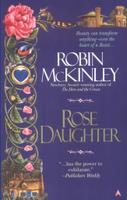Robin McKinley's later version of the Beauty & the Beast tale bears some marked changes from McKinley's earlier version of the tale-- this one, in some ways, reads more like a fable because of the names (like Lionheart and Jeweltongue, Beauty's sisters, or Mr. Horsewise). Perhaps the most significant thing, though, is the way that McKinley modifies and adapts the familiar fairy tale and turns it into a new story.
The character of Beauty in Rose Daughter is rather a departure from most of the other women in McKinley's books. It's almost as if the main character of McKinley's Beauty had been split into three characters-- the bold, horse-loving Lionheart (who even masquerades as a boy), the scholarly and witty Jeweltongue, and Beauty herself-- a kind, practical girl who loves to garden. She really loves all living things, as is made clear when we see her making friends by caring for unwanted animals and finding them homes. Beauty is also a much more reserved and less public person than her more flamboyant sisters. I also love the detail of the roses-- what would dead roses look like, to someone who loves plants but has never seen roses? All thorns and black and ugly-- but Beauty can tell they were important to whoever set up the garden, so she decides to wait one season to find out if they are worth all the trouble and the pain, and she loves them more than any other plant when they finally do bloom.
One interesting difference from the traditional version in this tale is the reason for Beast's form. He was a sorcerer-philosopher seeking knowledge who went too far-- but he was not evil or power-hungry in his search, so in restraining him the guardians of that knowledge accidentally touch him and give him something like their own form. This Beast is a rather different character from the spoiled young prince who is the first of his proud family to slip and be hit by an anicent curse.
The biggest point of difference in all of McKinley's Beauty & the Beast retellings is the ending. [Note that you may not want to read this if you have not yet read Rose Daughter or Sunshine and don't want to know how they end.] The ending of Beauty is right out of the fairy tale, although maybe a little grander and populated with the specific personages from Beauty's world. When you look at that ending in comparison with Rose Daughter, there is a bit of an inconsistency-- even in the first book, Beauty's family seems happier living a simple country life. Gervain can try on the fancy clothes from Beast and look like a Lord, but he's actually happier being a blacksmith. I sense this much more strongly in Rose Daughter-- the whole family is happier in their tiny country cottage than they were in their huge city mansion; they realize the duplicity of their city friends (most obvious in the two cancelled engagements of the older sisters). The father finally recovers from his wife's death and starts writing poetry. It would make much less sense for this family-- Beauty especially-- to go back to city life. However, as in the first version, this book still ends with a triple wedding.
It seems that sometimes writers must tell the same story repeatedly, and that they must first tell it one way before they can tell it another. I think this may be the case for McKinley-- it is only in her second re-telling that she is able to let her Beast remain a beast, and to let her characters stay in the simple lives they have come to love. And this is where I see the biggest connection to Sunshine: there, the beast is truly a monster inimical to humans. What happens on a smaller scale there happens here-- the girl saves the monster, the monster protects the girl. Allowing the beast to remain a beast at the end of Rose Daughter seems to open the door for Constantine in Sunshine-- he is an ancient monster, who is allowed to stay what he is. Also, the relationship between Con and Sunshine is different-- there are hints of attraction (and maybe more than hints), but it is against their very natures (and what would a marriage between Beauty and her untransfigured Beast look like, anyway?).
In her afterword, McKinley comments on this act of supposedly repeating herself, and what it means to her as a writer:
I read somewhere, a long time ago, a French writer, I think, saying that each writer only has one story to tell; it's whether or not they find interesting ways to retell it that is important. The idea has stuck with me because I suspect it's true. Maybe I shouldn't be surprised that my favourite fairy tale came back to me, dressed in a new story, after twenty more years in the back of my mind and the bottom of my heart-- and the odd major life crisis to break it loose and urge it into my consciousness.
Maybe it'll come to me again in another twenty years.
| Title: | Rose Daughter |
|---|---|
| Author: | Robin McKinley |
| Date published: | 1998 |
| Genre: | Fantasy |
| Number of pages: | 202 |
| Notes: | Second reading. |



0 comments:
Post a Comment